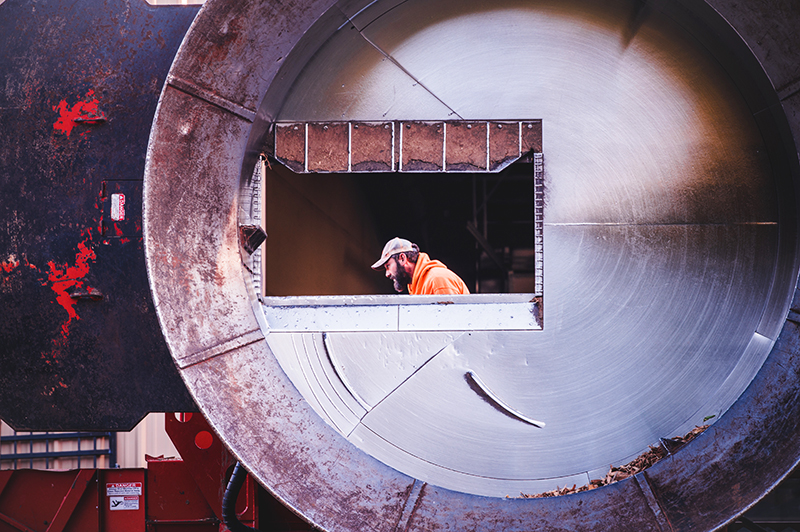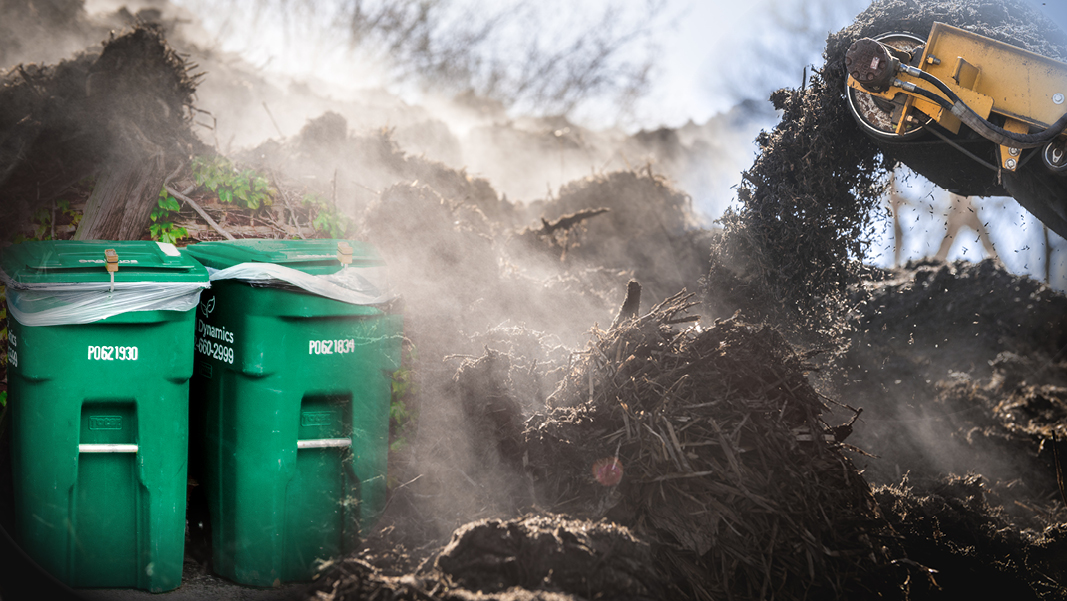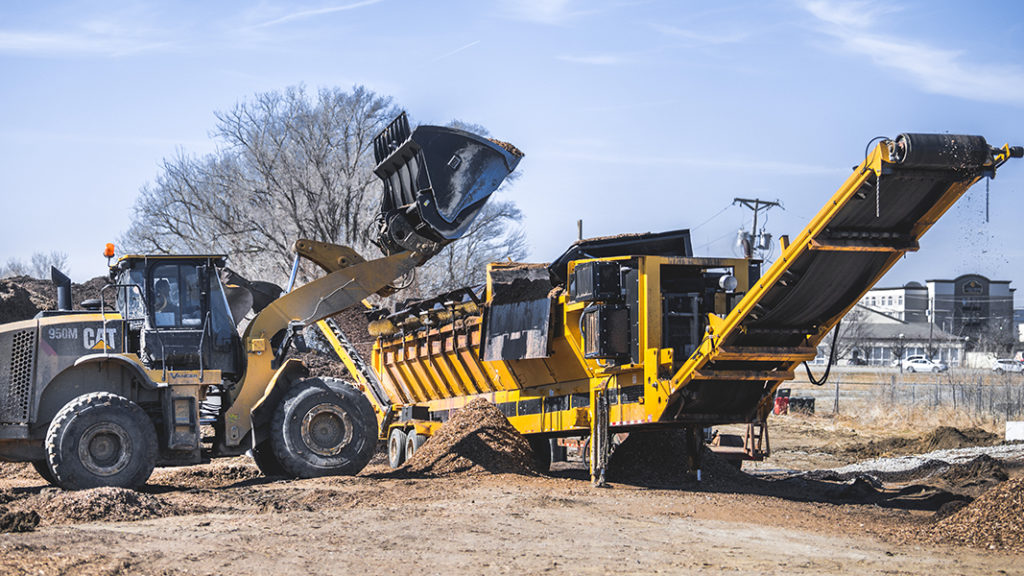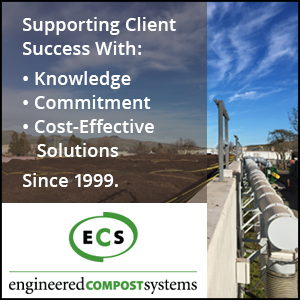Nora Goldstein

Andy Harpenau, founder of Gretna Sanitation, Soil Dynamics and Hillside Solutions, framed in the opening of the mobile tub grinder. Photos courtesy of Hillside Solutions
Andy Harpenau grew up on a farm in Nebraska, and then became a homebuilder. In 2004, the Harpenau family decided to pivot and form a traditional landfill and recycling hauling company named Gretna Sanitation to service communities in and around Omaha, Nebraska. The business grew to include thousands of residential and hundreds of commercial clients. Each spring, and into the summer, Gretna Sanitation’s trucks were overloaded with yard trimmings. And its costs to dispose of these loads at the landfill spiked. “We were hauling a lot of yard waste and we were trying to figure out a way to reduce tipping fee costs,” explains Harpenau. “It soon became evident that composting yard waste was not only an environmentally healthy alternative, but also an enticing entrepreneurial opportunity.”
Nebraska has a ban on disposal of yard trimmings (leaves and grass clippings) from April 1 through November 30. However, landfills with methane capture are approved to accept yard trimmings year round to “aid in methane production for a beneficial use,” according to the state law. The landfills servicing Omaha and the surrounding area have methane capture, thus can accept yard trimmings for disposal. State permitting is not an obstacle to starting a yard trimmings composting operation; the Nebraska Department of Environmental Quality (NDEQ) does not require a composting permit if the quantity accepted at the site is less than 100,000 cubic yards (cy)/year.
Launching Soil Dynamics
In the spring of 2011, Harpenau leased 27 acres on a farm located next to the Wildlife Safari park in Ashland, Nebraska and started Soil Dynamics, a composting company. Five acres are used for the composting operation. In the beginning, piles were turned with a tractor- pulled windrow turner. Overtime, a Morbark tub grinder was procured, along with a Vermeer trommel screen. The site also now has a Scarab turner. “We are the Omaha area’s first and only commercial composting farm and the only hauler that is composting,” notes Harpenau. “In 2014, after many hurdles, we received a local permit to also compost horse manure, manure from the safari park and source separated food waste that we began collecting. Once we figured out the recipes, food waste has not been difficult to work with. Since it’s mostly water, it is gone quickly.” The NDEQ allows yard trimmings sites to accept less than 1,000 cy/year of food waste before needing a state permit.
To build windrows, a base of wood chips (made from ground yard trimmings) is laid down, followed by the manures and food waste. Another layer of wood chips is added and then materials are blended using the windrow turner. Piles are capped with wood chips. To manage potential off-site odors, Soil Dynamics monitors weather patterns and only turns piles when the wind is not blowing in the direction of the closest odor receptor (a residence is about ¾ of a mile away), or when there are inversions that inhibit adequate atmospheric dispersion. While the company was still on its composting learning curve there were some odor impacts, primarily due to the manures. “Those have been fixed, but to monitor odor emissions, the county has an olfactory meter that it can use if there are complaints,” says Harpenau. “Our next step is to upgrade to a concrete pad with forced aeration.”
Soil Dynamics composts about 15,000 cy/year of yard trimmings, 10,000 to 15,000 cy/year of manures, and takes about 600 cy/year of food waste. After 8 weeks of active composting, material is moved to curing for up to a year. Compost is screened to half-inch particle size and sold by itself or in a variety of blends. The facility does accept BPI-certified compostable foodservice ware and liner bags. “We let the turner beat the heck out of loads containing those products,” adds Harpenau. “But they are a very small portion of our overall organics stream. Sometimes the liner bags take longer to break down than the other products.”
Organics Collection

Five stream sort at a Zero Waste Event. Gretna Sanitation collects glass containers separately from other recycled materials.

Brent Crampton, Director of Partnerships at Hillside Solutions, gives out compost samples at Zero Waste event.
To coordinate its various operations, Harpenau created Hillside Solutions in 2017 to connect schools, apartment communities, and businesses with the landfill, recycling, and organics hauling services of Gretna Sanitation and the composting process of Soil Dynamics. Prior to the pandemic, 22 schools were participating in food scraps recycling, reaching over 10,000 students. Hillside Solutions services businesses, corporate campuses and Creighton University in Omaha. “Creighton has 12 64-gallon carts which we service 3 times a week,” says Brent Crampton, Director of Partnerships at Hillside Solutions. “Since school started in the fall, meals are all being served in compostable takeout containers due to the pandemic. We collect those, along with the food waste.”
Gretna Sanitation uses a side-loading Hino truck to collect food waste. Originally, the truck pulled a trailer-mounted washing unit to clean the carts after unloading them. “It gets cold in the winter, which caused problems with the cart washing, and the unit was high maintenance,” notes Harpenau. “It also added a lot of weight for the truck to pull. We switched to lining the carts with a conventional garbage bag, and then add a compostable liner bag that the customer fills and we collect.”

A load with BPI-certified compostable products and food waste at Soil Dynamics prior to mixing with other feedstocks.
Commercial and institutional accounts may have up to 5 separate streams: organics, commingled paper and cardboard, commingled plastic and metal, glass only, and trash. Customers receive education and consultation about proper sorting, and have access to Hillside Solutions’ “Quick Start Guide.” Key is consistency around signage, notes Crampton. Gretna Sanitation drivers inspect the organics carts for contamination during collection, but most contamination gets noticed at the composting facility, prompting follow-up and additional education of customers on that day’s route as necessary.
On Earth Day 2019, Hillside Solutions launched Compost Club, a residential food waste drop-off service in Omaha. “We have about 350 members, and about 25 locations where food scraps can be dropped off,” explains Crampton. “All food waste, BPI-certified compostable foodservice ware, soiled paper and pizza boxes, and yard trimmings are accepted. We place 64-gallon carts at the drop-off sites. The carts have a combination lock on the lid to control contamination. Drop-off site hosts include churches, markets, food establishments and parks. The carts are emptied once a week.”
Members “accumulate” 432 square inches of soil every month, which they can redeem at the Soil Dynamics compost yard. They also get 20% off soil and mulch products. “And if you don’t need soil, you can donate it to one of our community garden partners during our spring give-a-thon,” says Crampton.
A potential market niche for Hillside Solutions are SIDS, or Sanitary and Improvement Districts that are unique to Nebraska (a law was passed in the 1960s). The owner of real estate that is not located within the boundaries of a city or other municipality who wants to develop the property will form the SID, which constructs and maintains the public improvements located within residential, commercial and industrial developments and subdivisions, including the streets, sanitary sewers, water systems, other utility services, sidewalks and parks. The SID issues tax-free warrants and bonds to pay for the public improvements, which are purchased by investors.
“The law allows SIDs, e.g., 1,000 house subdivisions, to contract with one trash hauler,” explains Harpenau. “Since we are the only hauler in the area with a composting facility, we are trying to educate the SIDs about composting. Other companies collect the yard waste with the trash, and then have a bin for recycling. In a contract with a SID, we would want to separate out the yard waste as an added service. It takes reeducation of the developers, who are more accustomed to having yard waste in the trash.”

















